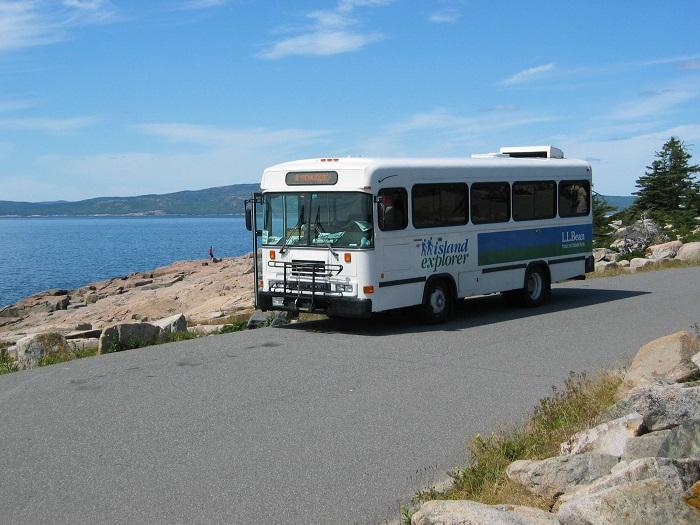
The Island Explorer bus services offers free transportation to hiking trails, carriage roads, island beaches, and in-town shops and restaurants in Acadia National Park/NPS
A reservation system on Cadillac Mountain, car quotas on Ocean Drive, and even closing the Park Loop Road to private vehicles during peak season are among the ideas under consideration as Acadia National Park forms a transportation plan aimed at improving the visitor experience while preserving natural and cultural resources.
Like many national parks across the country, visitors flocked to Acadia this summer, at some times diminishing the experience due to congestion on roadways and crowds at popular sites in the Maine park. Officials are taking public comments on “preliminary concepts” that could dramatically overhaul how visitors see Acadia. In addition to reservations and quotas, the park could introduce a concession-run bus operation (ending tour bus service), expand public transit, change the direction that traffic flows, and build new parking lots. The park is also trying to improve safety and reduce conflicts among different user groups, such as cars, tour buses, cyclists, and pedestrians.
“The preliminary concepts serve as conversation starters and represent a variety of possibilities that may be included in the long-term management framework for Acadia,” Superintendent Kevin Schneider said in a release. “We have not yet identified a preferred alternative and encourage the public to provide input and participate in this important planning process.”
A newsletter outlining the concepts is available at the park planning website, where comments are being accepted through November 30. For those in the area, the Park Service will hold open houses about the transportation plan November 2 in Prospect Harbor and November 3 in Bar Harbor (see below for details).
Although most of the concepts are focused on Mount Desert Island, the most popular section of the park, reservations and car-free periods are also possible on the Schoodic Peninsula.
During the scoping phase in the summer of 2015, the Park Service received about 300 comments from individuals and organizations. These ideas were used to help develop the preliminary concepts. The latest round of input will be used to create formal options for the transportation plan and an environmental impact statement, which the park hopes to release for feedback early in 2017.
In particular, Acadia officials would like responses to four questions:
- Which specific strategies in the preliminary concepts do you think should be carried forward to best achieve the purpose and address the need for the plan? Why do you think these strategies should be carried forward?
- Which specific strategies in the preliminary concepts do you think would not achieve the purpose and address the need for the plan? Why do you think these strategies should not be carried forward?
- Are there other strategies that should be included in the preliminary concepts that are not already presented? If so, which strategies and why should they be considered?
- What other comments or suggestions do you have?
To comment
- Deadline: November 30, 2016
- Online: http://parkplanning.nps.gov/ACADTransportationPlan
- Mail: Acadia National Park; ATTN: Transportation Plan; PO Box 177; Bar Harbor, ME 04609
- In person: 6:30-8:30 p.m. November 2 at Peninsula School (71 Main Street/Route 186) in Prospect Harbor; and 6:30-8:30 p.m. November 3 at Mount Desert Island High School (1081 Eagle Lake Road/Route 233) in Bar Harbor



Comments
The National Park Service is changing the way of life for Schoodic Peninsula. The bikers I have seen at Schoodic feel they are the only people who should be allowed here. Most of the local people on the Peninsula have accessed the Park their entire lives. We certainly don't feel comfortable or wanted now due to the campground and the Park. Local fishermen access the Park to check the weather and their gear. The Park is not friendly to locals.